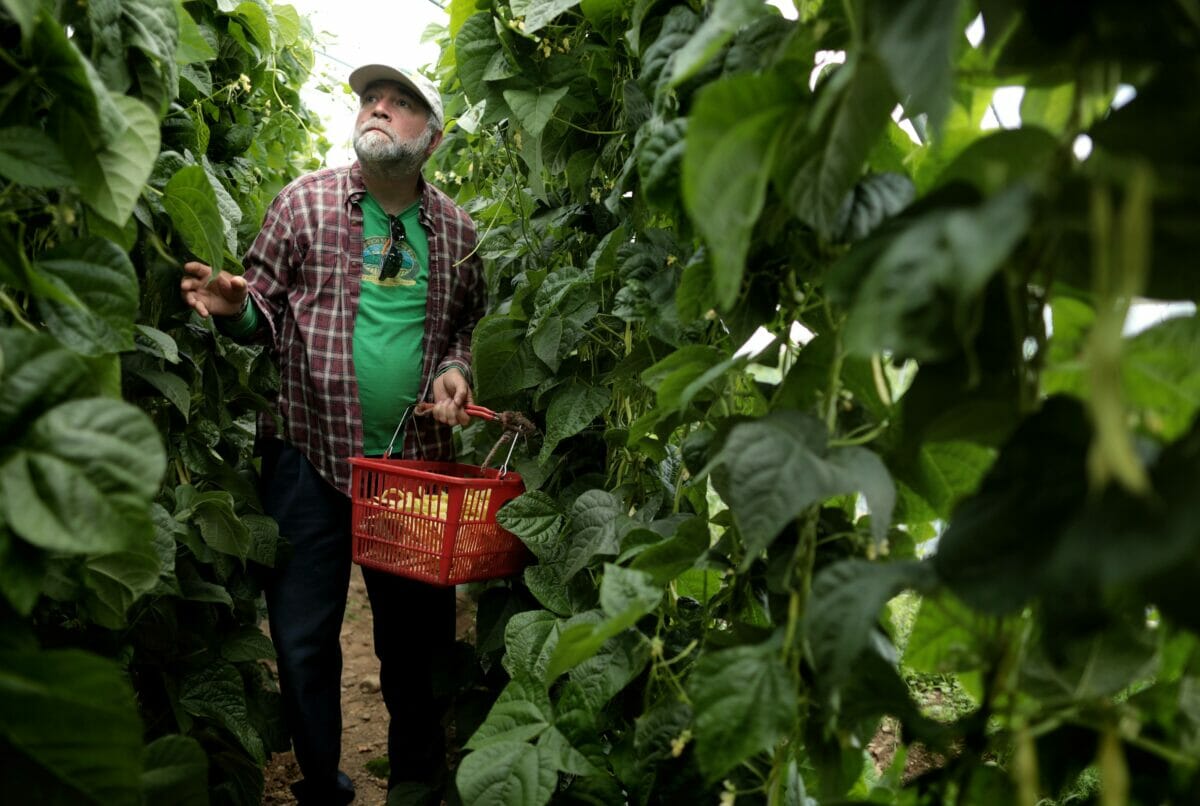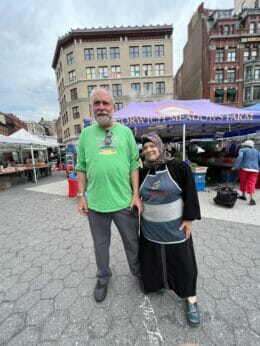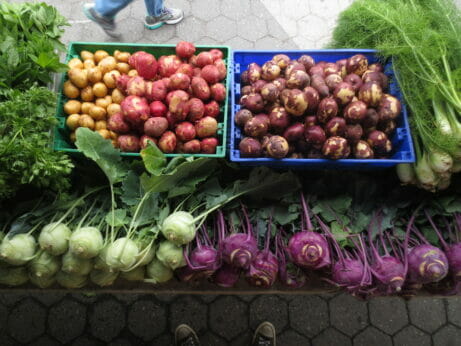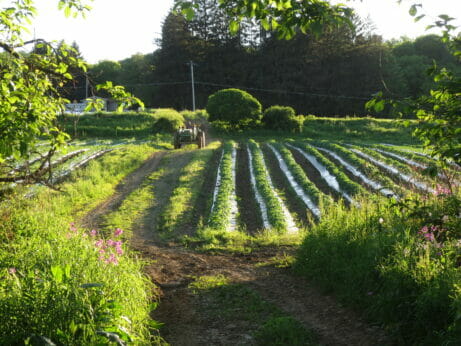Meet the Flavor-Focused Farmers Cultivating More Than a Thousand Crops
For Zaid and Haifa Kurdieh of Norwich Meadows Farm, crop diversity guides what grows.
Meet the Flavor-Focused Farmers Cultivating More Than a Thousand Crops
For Zaid and Haifa Kurdieh of Norwich Meadows Farm, crop diversity guides what grows.

“People can get almost everything at our stand,” says Zaid Kurdieh of Norwich Meadows Farm. by Brant Shapiro.
On most farms, a crop field is a timestamp that reflects a specific moment in a specific place. The fields at Norwich Meadows Farm, however, are more akin to a time capsule—or even a treasure chest. With their meticulously selected collection of approximately 1,300 crop varieties, farmers Zaid and Haifa Kurdieh have gathered generations of global agricultural activity on about 250 acres in Chenango County, New York.
The motivation behind the astonishing array of fruits and vegetables at Norwich Meadows Farm has always been, first and foremost, flavor.
“We grew up eating very flavorful produce,” says Kurdieh of himself and his wife Haifa, who were both raised in the Middle East. Kurdieh was born in Los Angeles, but spent his early years living in several different countries abroad, including Jordan, where he met Haifa while attending high school. After relocating to the United States, they wanted to share the tastes of their childhood with their new community. “An aspect of our culture is hospitality, so we want people to be able to enjoy what we enjoy.”
What began in 1998 with a few types of Middle Eastern vegetables grown in their backyard garden has since expanded into what Kurdieh refers to as “an international endeavor that is way bigger than our culinary heritage” and builds on the cultural identities of all 40 or so members of their farm team, as well as partnerships with farmers around the world. As their farm community gains new members, new seeds from their native countries, such as Korea and Italy, are added to the vast collection now cultivated at Norwich Meadows Farm.

These partnerships include years-long collaborations with two seed companies: Tokita Seed Company in Japan and Row 7 Seed Company in New York, both of which were established in 2018 and guided by the same goal: to grow the most flavorful food possible. With Tokita, Kurdieh became a participant of the Oishii Nippon Project, which seeks to preserve heirloom seeds cultivated for hundreds of years in Japan by sharing these seeds with growers everywhere. With Row 7, Kurdieh joined a team that includes chef Dan Barber of the Michelin-starred Manhattan restaurant Blue Hill and plant breeder Dr. Michael Mazourek of Cornell University to develop dazzling new crops.
Nowhere else beyond the borders of Norwich Meadows Farm will you find a field of negi (an allium similar to scallions that has grown in Japan for centuries) one season and a field of koginut (a squash developed in the US and first made available for sale just five years ago) in another.
For Kurdieh, this balance between tradition and innovation—and the crop diversity that has flourished along the way—is both a business decision and a personal preference.
Norwich Meadows Farm relies on a variety of revenue streams that cater to buyers big and small, but its most significant source of income depends on its presence at farmers markets around New York and New Jersey. Among these is the Union Square Market in New York City, where home cooks and some of the world’s most famous chefs shop side by side.
“People can get almost everything at our stand,” says Kurdieh. “And every week there’s something new. Having all that variety makes us stand out.”

“Variety” applies to both the extensive range of produce available—everything from berries and beans to ginger and greens—and the numerous kinds of any given crop, all of which are grown organically. Depending on the season, customers might encounter 80 varieties of tomatoes, 40 kinds of peppers, 25 types of beans or a dozen different kinds of potatoes.
Kurdieh explains that this approach to farming is also a risk mitigator. With so many different crops growing, the failure of one does not result in the failure of the farm as a whole. This is especially important as Norwich Meadows Farm experiences increasingly erratic weather patterns linked to the climate crisis.
“Overall temperatures are up, but the swings are much more pronounced and that has killed crops for us,” he says, citing an unusual period of freezing temperatures during a recent winter that destroyed half their garlic crop.

The advantages of biodiversity justify the enormous challenge of keeping track of more than a thousand unique crops at a time—particularly while Norwich Meadows Farm is currently understaffed due to a labor shortage affecting the entire agricultural sector—but it is the excitement of exploration and experimentation in the fields that underpins the business, which has come to be considered a trend leader in the food industry.
“Working with chefs and breeders and other people is very, very rewarding, especially when you can help make new fruit and vegetable varieties that are more healthy and more tasty,” says Kurideh. “It makes the demanding nature of this business a lot more palatable and fun.”
The work of farming has never been easy, so finding the fun in it is essential. For the Kurdiehs, the pursuit of flavor is what makes it all worth it, and for those who have the fortune of tasting what grows at Norwich Meadows Farm—whether it is the first season or the thousandth season for a particular plant variety—the delight of biting into a perfect piece of produce at its peak is timeless.
Follow us
This work is licensed under a Creative Commons Attribution-NoDerivatives 4.0 International License.
Want to republish a Modern Farmer story?
We are happy for Modern Farmer stories to be shared, and encourage you to republish our articles for your audience. When doing so, we ask that you follow these guidelines:
Please credit us and our writers
For the author byline, please use “Author Name, Modern Farmer.” At the top of our stories, if on the web, please include this text and link: “This story was originally published by Modern Farmer.”
Please make sure to include a link back to either our home page or the article URL.
At the bottom of the story, please include the following text:
“Modern Farmer is a nonprofit initiative dedicated to raising awareness and catalyzing action at the intersection of food, agriculture, and society. Read more at <link>Modern Farmer</link>.”
Use our widget
We’d like to be able to track our stories, so we ask that if you republish our content, you do so using our widget (located on the left hand side of the article). The HTML code has a built-in tracker that tells us the data and domain where the story was published, as well as view counts.
Check the image requirements
It’s your responsibility to confirm you're licensed to republish images in our articles. Some images, such as those from commercial providers, don't allow their images to be republished without permission or payment. Copyright terms are generally listed in the image caption and attribution. You are welcome to omit our images or substitute with your own. Charts and interactive graphics follow the same rules.
Don’t change too much. Or, ask us first.
Articles must be republished in their entirety. It’s okay to change references to time (“today” to “yesterday”) or location (“Iowa City, IA” to “here”). But please keep everything else the same.
If you feel strongly that a more material edit needs to be made, get in touch with us at [email protected]. We’re happy to discuss it with the original author, but we must have prior approval for changes before publication.
Special cases
Extracts. You may run the first few lines or paragraphs of the article and then say: “Read the full article at Modern Farmer” with a link back to the original article.
Quotes. You may quote authors provided you include a link back to the article URL.
Translations. These require writer approval. To inquire about translation of a Modern Farmer article, contact us at [email protected]
Signed consent / copyright release forms. These are not required, provided you are following these guidelines.
Print. Articles can be republished in print under these same rules, with the exception that you do not need to include the links.
Tag us
When sharing the story on social media, please tag us using the following: - Twitter (@ModFarm) - Facebook (@ModernFarmerMedia) - Instagram (@modfarm)
Use our content respectfully
Modern Farmer is a nonprofit and as such we share our content for free and in good faith in order to reach new audiences. Respectfully,
No selling ads against our stories. It’s okay to put our stories on pages with ads.
Don’t republish our material wholesale, or automatically; you need to select stories to be republished individually.
You have no rights to sell, license, syndicate, or otherwise represent yourself as the authorized owner of our material to any third parties. This means that you cannot actively publish or submit our work for syndication to third party platforms or apps like Apple News or Google News. We understand that publishers cannot fully control when certain third parties automatically summarize or crawl content from publishers’ own sites.
Keep in touch
We want to hear from you if you love Modern Farmer content, have a collaboration idea, or anything else to share. As a nonprofit outlet, we work in service of our community and are always open to comments, feedback, and ideas. Contact us at [email protected].by Elena Valeriote, Modern Farmer
August 4, 2023
Modern Farmer Weekly
Solutions Hub
Innovations, ideas and inspiration. Actionable solutions for a resilient food system.
ExploreExplore other topics
Share With Us
We want to hear from Modern Farmer readers who have thoughtful commentary, actionable solutions, or helpful ideas to share.
SubmitNecessary cookies are absolutely essential for the website to function properly. This category only includes cookies that ensures basic functionalities and security features of the website. These cookies do not store any personal information.
Any cookies that may not be particularly necessary for the website to function and are used specifically to collect user personal data via analytics, ads, other embedded contents are termed as non-necessary cookies.
Love the work! Inspiring